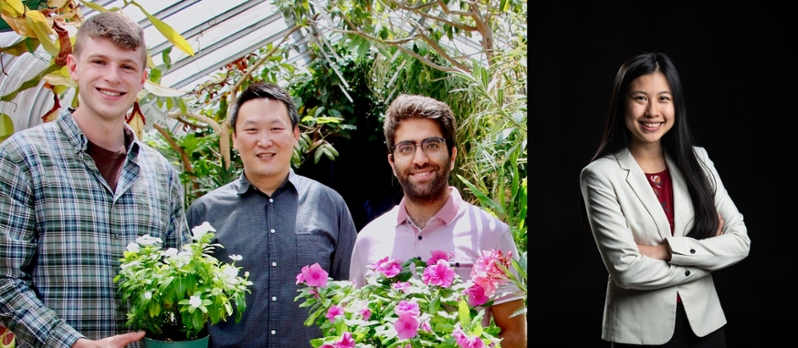New biochemistry research provides groundbreaking insight for production of key chemotherapy drug
Author: UNB Research
Posted on Jun 27, 2022
Category: Research , Faculty of Science , Publications , Category

For decades, vinblastine has been an important medicine in chemotherapy regimens to treat a number of cancers and has helped save countless thousands of lives. In fact, the World Health Organization includes it on their List of Essential Medicines.
And yet, in spite of its importance for modern, Western medicine, the world’s commercial supply stems from a single, natural source: the Madagascar periwinkle.
“Because vinblastine is highly complex in structure and stereochemistry,” says Dr. Yang Qu, “this alkaloid drug has never been commercially synthesized by chemical methods, but is instead isolated from the only plant that produces it: Madagascar’s periwinkle, Catharanthus roseus.”
Since vinblastine’s original discovery in 1958, and owing to its value and importance, there has been a significant amount of fundamental and applied research on the chemical, and on other, plant-derived medicinal alkaloids.
Today, related research on plant metabolites has yielded significant benefits for human health: about one-quarter of modern medicines are based on plant metabolites – including more than 60% of antibiotic and anti-cancer drugs, says Dr. Qu.
Bit by bit, researchers like Dr. Qu are getting to the roots of the understanding how these metabolic processes work.
In 2018, the complete, 28-step biosynthesis of vinblastine was documented by Dr. Qu and other colleagues around the world, marking a significant achievement in plant metabolism research and paving the way for potential microbial production of this expensive drug without the need of plants. However, Still, there are steps needed to understand more of vinblastine metabolism in Madagascar’s periwinkle plant.
Dr. Qu is the corresponding author on a new paper published in Nature Communications, and his co-authors include three former students: Jasmine Eng and Daniel Smith, who recently graduated from UNB with bachelor’s degrees in biochemistry; and Mohammadamin Shahsavarani, a recent master’s degree graduate.
In their research, the team discovered a previously unknown enzyme in the periwinkle plant, which accelerates a redox-neutral reaction highly unusual to its enzyme class, which is a reaction where no external oxidizing or reducing agent is involved. This particular reaction diverts the assembly of vinblastine towards three other alternative alkaloids.
This discovery doesn’t simply advance our knowledge of how the plant functions, according to Dr. Qu; it provides a new goal for periwinkle breeding and may well help save more lives by increasing our ability to produce vinblastine:
“Engineering this particular segment pathway may increase the vinblastine yield from the Madagascar periwinkle, and the knowledge from studying this enzyme and others, has enabled the production of vinblastine drug precursors without the need of a plant,” he says, “which we demonstrate in an article led by Mohammadamin and currently under peer-review.”
The full article in Nature Communications is available at
https://doi.org/10.1038/s41467-022-31100-1.
The preprint of the second, upcoming article is available at
https://doi.org/10.1101/2022.06.08.495323.
More information
Dr. Yang Qu (orcid) | Department of Chemistry | Faculty of Science
Research at UNB | Graduate Studies at UNB | Postdoctoral fellowships
In the photo (left to right): Daniel Smith, Dr. Yang Qu, Mohammadamin Shahsavarani, Jasmine Eng.